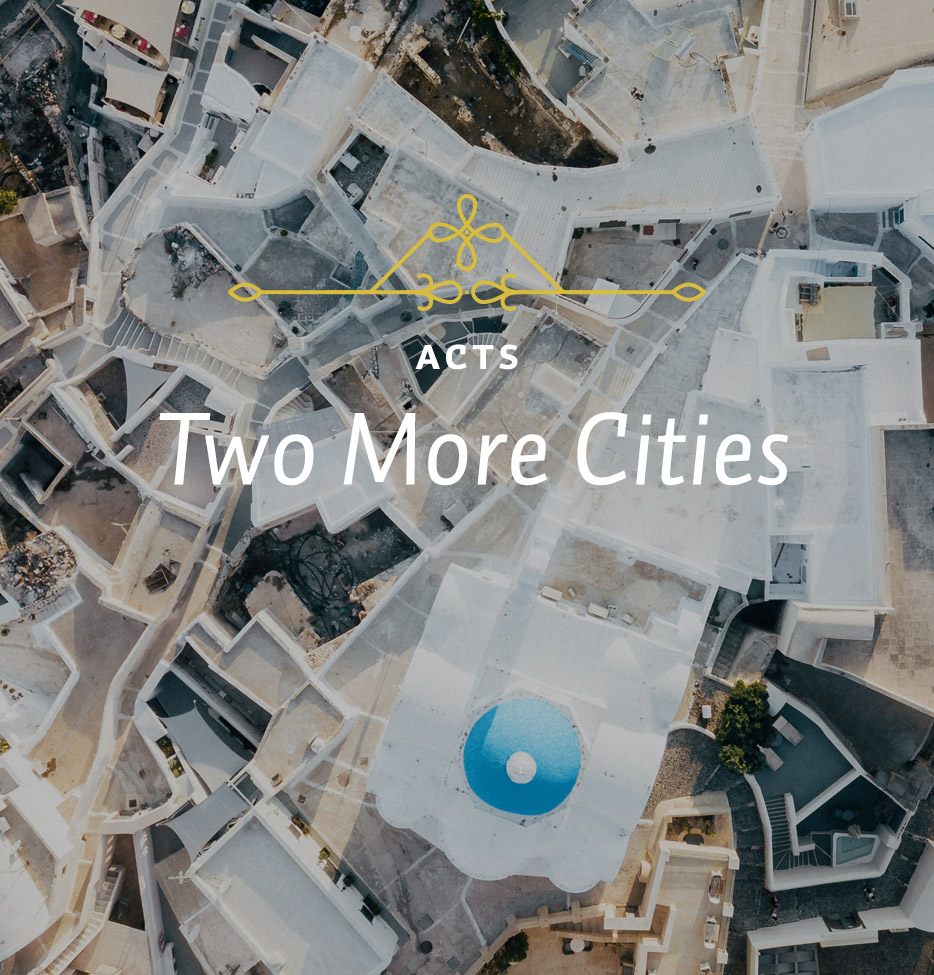The seventeenth chapter of Acts is best known for the sermon Paul preached on Mars Hill in Athens. But that is only in the second half of the chapter. In the first half of chapter 17 we find Paul not in Athens but in two other Greek cities: Thessalonica in the north, and Berea on the way from Thessalonica south toward Athens.
This is an interesting place to reflect on the importance of cities in the Bible. People who have studied them have pointed out that there are more than 1,400 references to cities and that there are more than twenty-five careful studies of a mission to a particular city. Acts is a great example. Acts begins in a city— Jerusalem, that most important of all biblical cities—and it progresses through scores of cities until, toward the end of the book, we find Paul and his friends in Rome. Thus, Acts moves from the most important biblical city to the most important secular city of that day.
Paul and his fellow missionaries had been commissioned by a city church, the church of Antioch. It was the first mission-minded church of the New Testament era. It was cosmopolitan because Antioch was a cosmopolitan city, and it was out of the particular sensitivities of the Christians in that city that the missionary enterprise developed. From this point on, we find Paul in Athens, the great intellectual center, Corinth, a great commercial center, and finally Ephesus, the political center of the region, where some of his most significant work was done.
Paul’s strategy seems to have been to go into a city, and to plant a church there. Paul was not unconcerned for other areas. But he knew that if he planted strong Christian churches in cities, the Gospel (like everything else) would eventually spread from those centers to the outlying regions. We have two examples of his strategy in this chapter.
The first example is Thessalonica. Thessalonica was an important city. It was a port, first of all. It was not as great a commercial city as Corinth, which was in a more direct line of commerce, sitting, as it did, astride the isthmus linking northern and southern Greece. Nevertheless, Thessalonica was the chief city of Macedonia. Much of the produce of Macedonia left from Thessalonica and many of the items imported into Macedonia passed through it. It is there today, though it has a slightly different name. It is known as Salonika.
What was Paul’s mission strategy in Thessalonica?
1. Establish contact. The first thing Paul did was establish contact with the city’s residents. Paul’s chief contact point was the synagogue because he had a hearing there. The synagogue was the place where godly Jews and God-fearing Gentiles would gather to read the Jewish Scriptures. That was a great advantage for Paul. When he went to a synagogue, he found people who were already interested in religious things and familiar with the Word of God. They did not know about Jesus Christ to whom the Scriptures pointed. But on the basis of their prior knowledge Paul had an open door for announcing Christ to them.
I suggest that to reach today’s world we also should focus on the cities. That is where a majority of the people are, and more people are moving to the cities all the time. Moreover, I would also suggest that when we focus on the cities we should look for points of contact.
What are those points? Are they synagogues? No. In most places that would not be an effective point of contact today. What then? My experience in Philadelphia, where I work, suggests that today the greatest point of contact for sharing the Gospel is those areas of city life where Christians can be of service to city people. City people are conscious of their needs. Some are single but have children. They need to work. They wonder what they are going to do with their young children. A good point of contact with such people is a preschool. We established one at Tenth Presbyterian Church years ago, and I suppose that over the years we had more fruitful contacts with city people through that means than perhaps anything else we did up to that time.






